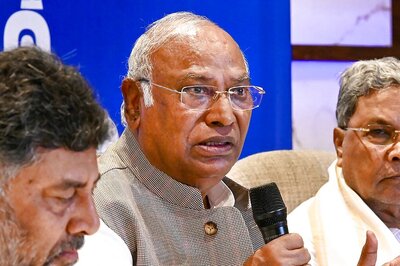
views
Ministers from India, the UK, France, and Japan convened at the Global Partnership on AI (GPAI) Summit in the capital, announcing the unanimous adoption of the New Delhi Declaration after a comprehensive over four and a half hours of discussion. Rajeev Chandrasekhar, India’s minister of state for electronics and information technology, highlighted the monumental agreement as a pivotal step towards shaping AI’s future.
He stated that adopting the New Delhi Declaration has propelled the GPAI to the forefront, positioning it as a paramount influencer in determining the narrative and governance framework steering the course of AI today and in the future. He emphasised the urgency for cohesive efforts to harness AI’s potential while addressing safety and trust concerns that have emerged in the rapidly evolving artificial intelligence landscape.
Chandrasekhar outlined GPAI’s objectives, focusing on collaborative innovation, a robust governance framework, and a commitment to inclusive partnerships, especially with countries from the global south. As per the minister, the representation of these nations was deemed essential in GPAI’s mission, leading to Senegal’s elevation to the steering committee during India’s presidency, showcasing the alliance’s dedication to broader inclusion.
Highlighting the significance of GPAI in the global artificial intelligence discourse, Chandrasekhar stressed its role in shaping AI frameworks amid multiple ongoing conversations worldwide. He underscored GPAI’s distinctive impact owing to its scale, membership, and commitment, asserting its leadership in evolving AI frameworks in the months ahead.
“GPAI and the New Delhi Declaration take on a different significance because of the context that we are in today compared to the context that we were in a year or two years ago. That is why the discussions that took place take on a more important significance and the fact that we have now said that our ambition is that GPAI should in a sense lead the discourse in given the new context or the AI-intensive world that we live in,” he added.
Jean-Noel Barrot, France’s minister delegate to the minister of economy, finance, and digital sovereignty, underscored the acceleration of AI development witnessed in the past months. Barrot echoed Chandrasekhar’s sentiments on the New Delhi Declaration, expressing GPAI’s commitment to fostering human-centric AI while remaining open to like-minded partners dedicated to democratic values.
Barrot lauded Japan’s decision to establish a third expert support centre, augmenting GPAI’s global reach and resources. He highlighted the collaborative nature of GPAI, highlighting efforts to synergise expertise from the OECD, extending the partnership’s capacity to devise effective governance and deployment strategies for AI.
Hiroshi Yoshida, Japan’s vice minister for policy coordination, echoed support for the Ministers’ Declaration, advocating for GPAI’s increased inclusivity to encourage participation from developing countries. He highlighted Japan’s Tokyo centre as a hub for Asian countries to engage in discussions with GPAI members and experts, underlining its pivotal role in extending the alliance’s reach within the region.

















Comments
0 comment